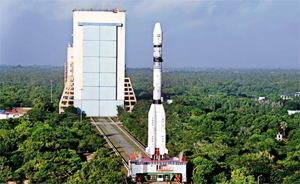Sriharikota (Andhra Pradesh), Aug 27: India successfully launched its communication satellite GSAT-6, which has several strategic applications, in textbook style on Thursday using its heavy rocket geosynchronous satellite launch vehicle (GSLV-D6).
The GSLV rocket, with a cryogenic engine, slung the satellite in a geosynchronous transfer orbit (GTO) from where it would be taken up to its final geostationary orbit.
The successful flight of GSLV rocket gives the Indian space programme a much-needed booster as getting the more-efficient cryogenic engine (which provides more thrust for every kilogram of propellant burnt) right is important for its future space programmes.
Indian space scientists have spent around two decades in conceiving the cryogenic technology and spent around Rs.400 crore in developing it.
Precisely at 4.52 p.m., the Geosynchronous Satellite Launch Vehicle-Development 5 (GSLV D6) rose from the second launch pad here at Satish Dhawan Space Centre.
The 49.1 metre tall rocket weighing 416 tonnes slung the 2,117 kg GSAT-6 communication satellite in the geosynchronous transfer orbit (GTO) around 17 minutes into the flight.
As the whole mission concluded successfully, ISRO scientists at the mission control centre were visibly happy, back-slapping and hugging each other once the rocket ejected the GSAT-6 satellite into the intended orbit.
Speaking about the launch, ISRO chairman A.S.Kiran Kumar said: "Today's performance of launch vehicle was normal. The intricacies of cryogenic engine has been understood."
This is the first successful GSLV rocket launch that placed a satellite in orbit in Kiran Kumar's tenure.
The Indian space agency flew the GSLV rocket with its own cryogenic engine for the second time on Thursday after the successful launch of a similar rocket in January 2014 that put into orbit GSAT-14.
This was the second mission of GSLV during the last five years after two such rockets failed in 2010.
One of the GSLV rockets flew with Indian cryogenic engine and the other one with a Russian engine.
The GSLV is a three stage/engine rocket. The core of first stage is fired with solid fuel while the four strap-on motors by liquid fuel. The second is the liquid fuel and the third is the cryogenic engine.
For the country, ISRO's perfection of cryogenic engine technology is crucial as precious foreign exchange can be saved by launching communication satellites by itself.
Currently ISRO flies its heavy communication satellites by European space agency Ariane.
ISRO officials told IANS earlier that the country pays around $85-90 million or around Rs.500 crore as launch fee for sending up a 3.5 tonne communication satellites. The cost of satellite is separate.
The ISRO can send smaller communication satellites - weighing around two tonnes - till such time it gets ready an advanced GSLV variant-GSLV-Mark III- that can lug satellites weighing around four tonnes.
The space agency will be launching satellites like GSAT-7, 9 using a similar rocket.
One of the notable aspect of the successful launch is the rocket's weight lift capacity. The current GSLV rocket that ISRO flies has a carrying capacity of around 2.2 tonnes.
Earlier attempts to carry slightly over two tonne satellite ended in partial/total failures.
The GSAT-6 is India's 25th geostationary communication satellite and twelfth in the GSAT series.
Five of GSAT-6's predecessors were launched by GSLV during 2001, 2003, 2004, 2007 and 2014 respectively.
After its commissioning, GSAT-6 will join the group of India's other operational geostationary satellites.
The satellite provides communication through five spot beams in S-band and a national beam in C-band for strategic users.
One of the advanced features of GSAT-6 satellite is its S-Band Unfurlable Antenna of six metre diameter - the largest satellite antenna realised by ISRO. This antenna is utilised for five spot beams over the Indian mainland, which exploit the frequency reuse scheme to increase frequency spectrum utilisation efficiency.
The satellite's life expectancy is nine years.






Comments
Add new comment